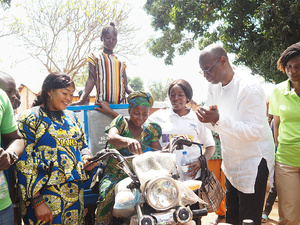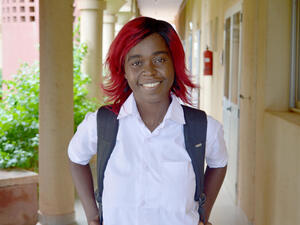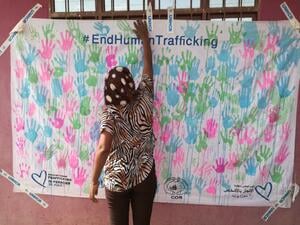UNHCR conducts census of refugees in Côte d'Ivoire
UNHCR conducts census of refugees in Côte d'Ivoire
The peace-building and income-generating skills of Sudanese refugee women (seen here in Kenya's Kakuma camp) will help repatriation and reintegration in south Sudan, says UNHCR.
ABIDJAN, Côte d'Ivoire, May 24 (UNHCR) - A census is underway in Côte d'Ivoire to register all refugees, predominantly of Liberian and Sierra Leonean origin, presently in the country. Conducted by UNHCR in close co-operation with the government of Côte d'Ivoire, this new operation comes as thousands of new refugees are arriving from war-torn Liberia.
Between May 11 and June 14, UNHCR/government field teams accompanied by ONI - National Identification Office teams which will eventually hand out registration cards - will be visiting 147 sites close to the borders with Liberia and Guinea to register refugees.
"We expect to see a sharp decrease of registered refugees," said UNHCR's Senior Regional Technical Officer Ioli Kimyaci, who is co-ordinating the operation. "Since the last registration in 1997, during which 210,000 refugees were registered, over half returned home or went elsewhere."
She added, "But the final number will be increased by new arrivals."
Refugees have been arriving in Côte d'Ivoire since the early 1990s on an irregular basis, with a sharp increase in arrivals since last year as fighting intensified in neighbouring countries.
At the end of December 2001, it was estimated that over 120,000 refugees, mostly Liberians, remained in the country. Since the beginning of this year, the aggravation of the situation in Liberia has led to a further influx of over 9,000 Liberians.
Over the last week alone, more than 2,500 new arrivals were registered. Many arrived in Danané but travelled on to Tabou as they preferred to be close to their fellow ethnic Grebo people. Others of the Krahn origin decided to stay around Danané. The recent refugees came mainly from Lofa and Bong counties and claimed to have fled because of the escalating combat in their home areas.
UNHCR's current registration exercise was preceded by an extensive information campaign to ensure that the refugees understand the importance of being registered.
"I am glad that I heard about the registration," said Grace, a refugee of Krahn origin who has been living with relatives near Danané since heavy fighting broke out in Liberia last year. "At least I will be able to send my children to school now and hopefully get a registration card. And maybe, if things get better, one day I'll return home."
"The registration teams in the field will collect more information than just basic bio-data," said UNHCR's Kimyaci, who just returned from a week in the field. "Through additional questionnaires we will actually learn more about the refugees' wishes: Do they want to stay and integrate or return home? Do they wish for further education or vocational training? Do the children go to an Ivorian/Liberian school or none at all? These questions are being asked to all refugees and will be analysed later."
Depending on the number of new recent arrivals, the outcome of the registration should normally not affect UNHCR's yearly budget too much.
"Since 1999, only those refugees remaining in Nicla camp have been continuously assisted by UNHCR and its partners with food and non-food items, such as blankets, kitchen sets, mattresses, as well as free medical care," said Margarida Fawke, UNHCR Programme Officer in Côte d'Ivoire.
She added, "New arrivals who actually register, but do not require the assistance provided in the camp, receive basic assistance for 6 months and are given access to vocational training and micro-credit projects. In addition, in exceptional cases medical care is provided when needed."
The Côte d'Ivoire government gives all children the opportunity to go to school. If the Liberian crisis escalates, additional care and maintenance will have to be given and camps will need to be built.
In Côte d'Ivoire, with the exception of some 3,500 living in Nicla camp, most of the refugees live dispersed in villages and towns on a 500-km-long and 50-km-wide stretch of land bordering Liberia known as the Zone d'accueil des réfugiés (ZAR). Over 2,000 Sierra Leoneans live alongside the Liberians.
Côte d'Ivoire also hosts some 2,200 refugees and asylum seekers of urban origin principally from Congo-Brazzaville, the Democratic Republic of the Congo, Rwanda and Burundi, the majority of whom live in Abidjan.






